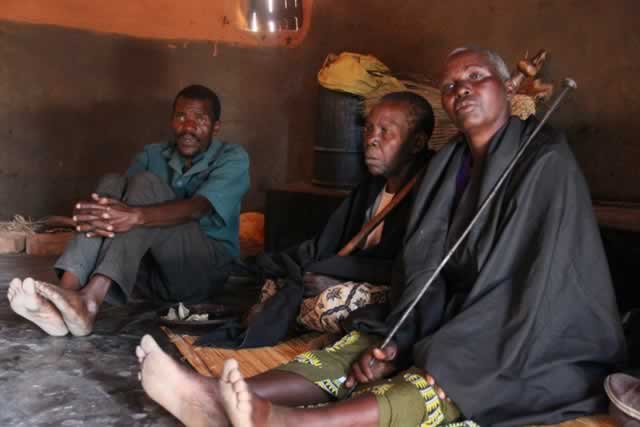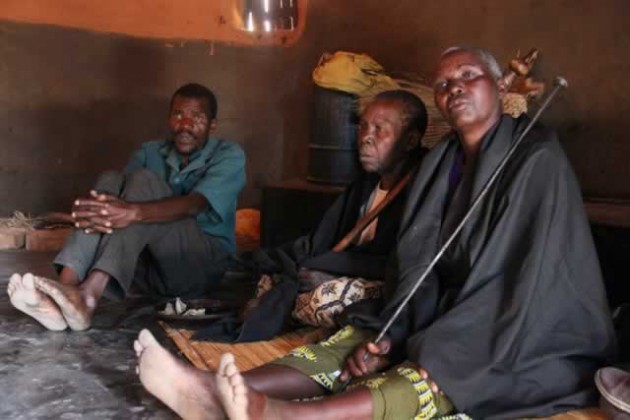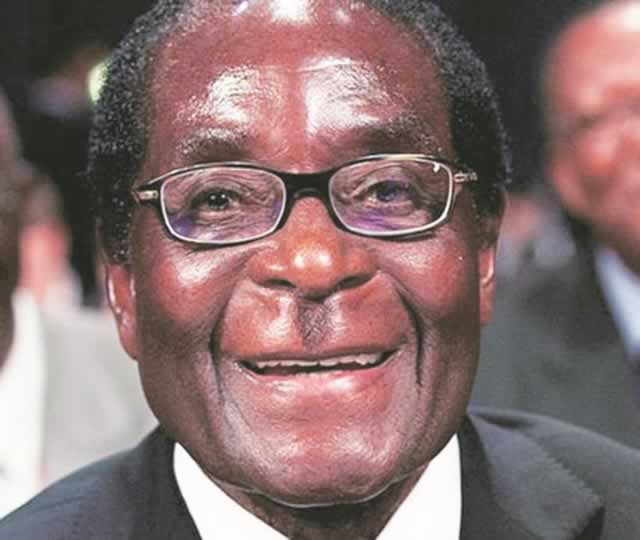Chingaira: Defiant to the end

Christopher Farai Charamba Features Correspondent
Accused of being a terrorist, Chief Mutota Chingaira Makoni stood up to the British settler firing squad and said to them: “It is all very well to call me a rebel but this country belonged to me and my forefathers before you came.”
Daring and defiant, Chief Chingaira led a protracted campaign against the invading British in the Makoni area from 1894 till his death in 1896.
With the assistance of his cousin Nyauta, popularly known as Kamba, Chief Chingaira was able to match the military strength of the British with own set of firearms.
Captured and executed on September 4, 1896, Chief Chingaira was then decapitated and his head taken as a trophy, first to South Africa and then to Britain where it was put on display in a British museum.
Ishe Donald Kamba Makoni, a direct descendant of Nyauta Kamba, shared with The Herald the Makoni family history relating to his ancestor, Chief Chingaira.
“The Makoni royal family is a two chieftainship household shared between the descendants of Nyamanhindi and Nyakurukwa.
“In 1840 during the reign of Zendera Makoni, the chieftainship was usurped by Mukunyadze and for five years the Makoni royal family lost its chieftainship. It was only returned due to the combined efforts of Nyamanhindi and his brothers Muchichwa and Nyakurukwa,” he said.
Between 1845 and 1869 Nyamanhindi reigned as the chief of the Makoni people. When he died it was the turn of his brother Nyakurukwa to assume the throne and he ruled from 1865 to 1889. For more than 20 years of his rule, Nyakurukwa was not at peace, constantly fighting against the Mutasa as well as the invading Ndebele.

Spirit mediums (from right) Mbuya Mugarandega and Mbuya Nyakutumbwa explain the history of Chief Chingaira Makoni while Mr Joseph Nyakutumbwa (left) listens
“Born Mutota Chirimaunga, the fifth son of Nyamanhindi and future chief, was more popularly known as Chingaira because he was said to have eyes like an eagle and would swoop down on an enemy in the same manner an eagle does on its prey.
“Chingaira was very close to his cousin Nyauta Kamba the son of Nyakurukwa and the two were rarely seen apart.
“The two were said to be adventurous and daring from their early childhood though some might describe it as naughty,” Ishe Kamba shared.
When the turn for the Nyamanhindi household to take over the chieftainship came, Chingaira’s older brothers Denhere, Bururenhuka, Mupawashe and Gumboreshumba refused the throne for fear of war against the Ndebele, the Mutasa as well as the new white invaders. Chingaira had previously stated that he desired to be chief and so his brothers supported his claim to the throne.
Fearing that he did not have the material wealth to support his claim to the throne, Chingaira offered it to his cousin Kamba who was wealthy.
“Kamba declined saying that it was the turn of the Nyamanhindi house. He however said he would support Chingaira not with spears, bows and arrows but guns sourced from Antonio De Souza, also known as Guvheya from Portuguese East Africa, now Mozambique,” Ishe Kamba added.
Soon after he became chief, Chingaira was at war with the Mutasa in what was known as Hondo yeMhanda. During this war the best warriors of the Makoni and the Mutasa people are said to have died. Seeing that some of the fiercest fighters such as Mombeyarara, Mhiripiri and Chipunza had been killed, Humba Makombe forced a truce between the two sides. According to Ishe Kamba, “Humba Makombe was concerned with the loss of life on both sides and made peace between the two families. He gave each side one of his daughters and said henceforth the two would be brothers.
“The war ended in 1893 and its end was fortuitous because from about 1894, the white settlers had begun to establish themselves in the area and pose a threat to both the Makoni and the Mutasa.”
Chingaira was a highly organised and well equipped military man who enforced strict discipline amongst his troops. For years Chingaira ambushed and sabotaged the white settlers. They would cut transmitter cables effectively disrupting communication between whites in Bulawayo and those in Mutare. Unable to fend off Chingaira alone, the white settlers sought help from Captain Watts who came from Mozambique. Watts underestimated Chingaira’s military capabilities and arrogantly thought he would do away with him quickly asking, “Who can withstand the Maxim gun?”
“It was Ross the District Commissioner based in Rusape who warned Watts that Chingaira had firearms of his own. To test if Ross’s claims were true, when the white troops advancing from Mutare reached the Devil’s Pass, they fired their guns and in response Chingaira’s men fired theirs.
“This forced the whites to strategise about how to deal with Chingaira as he was hidden in the mountains and difficult to lure out despite the many emissaries Ross sent claiming he just wanted to talk to Chingaira,” Ishe Kamba said.
Losing their patience, the whites invaded Chingaira’s cave at Gwindingwi on August 4, 1896. Unable to match Chingaira’s military prowess due to the terrain, the white settlers lost the battle and suffered nine causalities. These men were buried with three others who were to lose their lives in a subsequent battle on a farm near St Faith’s close to Nyabadza. The white troops retreated for a month after their defeat and actively pursued other means of luring Chingaira out of his cave. Ishe Kamba explains that there are various versions of what happened leading to the capture of Chingaira.
“Some people claim that it was Ndapfunya, the younger brother of Kamba and Chipunza, who sold out Chingaira to the whites. This however is untrue and was used by the whites as divide and rule tactic by bringing division and resentment in the Makoni household.
“What really transpired was that Dlamini, a messenger who worked in the District Commissioner’s Office, was sent to convince Chingaira to come out of hiding and guarantee his safety. When Chingaira agreed and came out, the whites were positioned close by and apprehended him.”
It is claimed that before Chingaira was executed he called upon his aides and instructed them that since he was going to die, they must ensure that he was buried according to the customs of the Makoni people. When his aides did not respond fearing the white firing squad, Chingaira burst out in anger and said to them: “When I was your chief you jumped at my smallest word but now you cannot even answer me. May the curse of the gods fall upon you if you do not see to it that I am given a proper burial in accordance with our tradition.”
The spirit mediums of the Makoni people, Sekuru Mubvakure and Sekuru Sakureba, said it was necessary for the head of Chingaira to be returned so that his final wishes may be fulfilled.
“Chingaira’s head was taken because the whites thought that they could capture his intelligence. The same way the head was taken is the way it should return. Those that took it must explain what they wanted with it.
“The head needs to be returned so that there is peace in the land. These are the wishes of Chingaira. Once the head is returned and the proper customs of the Makoni people are observed, there shall be peace and calmness.
“When the head returns it should be given to Kamba whom we have chosen as the chief of the Makoni people. It is he who will decide how to proceed with the business of honouring Chingaira.
“Before he died we told Chingaira that he would be killed but he was stubborn and continued his war against the whites. When the head returns, his body can be retrieved from Gwindingwi where he fell and he can be put to rest in his rightful place among the other chiefs,” they said.
The reigning chief of the Makoni people Chief Gwasira commented on the return of Chief Chingaira’s head, saying they had been lobbying Government for years regarding the repatriation of their ancestor.
“Chingaira was a gallant fighter of the First Chimurenga who resisted colonialism. We have been working with the Ministry of Local Government, National Works and Public Housing regarding the repatriation of his remains so that we can perform the proper burial rituals for a chief according to our customs.”
Chief Gwasira disputed the claim made by the spirit mediums Sekuru Mubvakure and Sekuru Sakureba regarding who should collect, saying that Kamba cannot be the one to go and collect it.
“We have a committee set up within our family chaired by myself as chief and with a representative of the Nyamanhindi house from which Chingaira came. Kamba is from the Nyakurukwa line and so he cannot be the one to stand on these matters when a descendant of Chingaira is present,” he said.
According to Chief Gwasira, the Makoni royal family is a four chieftainship household from the line of Muswati, Zendera, Nyamanhindi and Nyakurukwa. The premier spirit medium in the Makoni household is known as Chendambuya.
Feedback: [email protected]











Comments